Oba Funsho Adeolu: The account of the controversial ritual involved in burial of beloved actor and king
Neusroom revisits the story of Oba Funsho Adeolu, the actor and King of Ode Remo, who died in 2008, in an attempt to unravel the mystery behind what happened to his body when it was received by the kingmakers for burial.
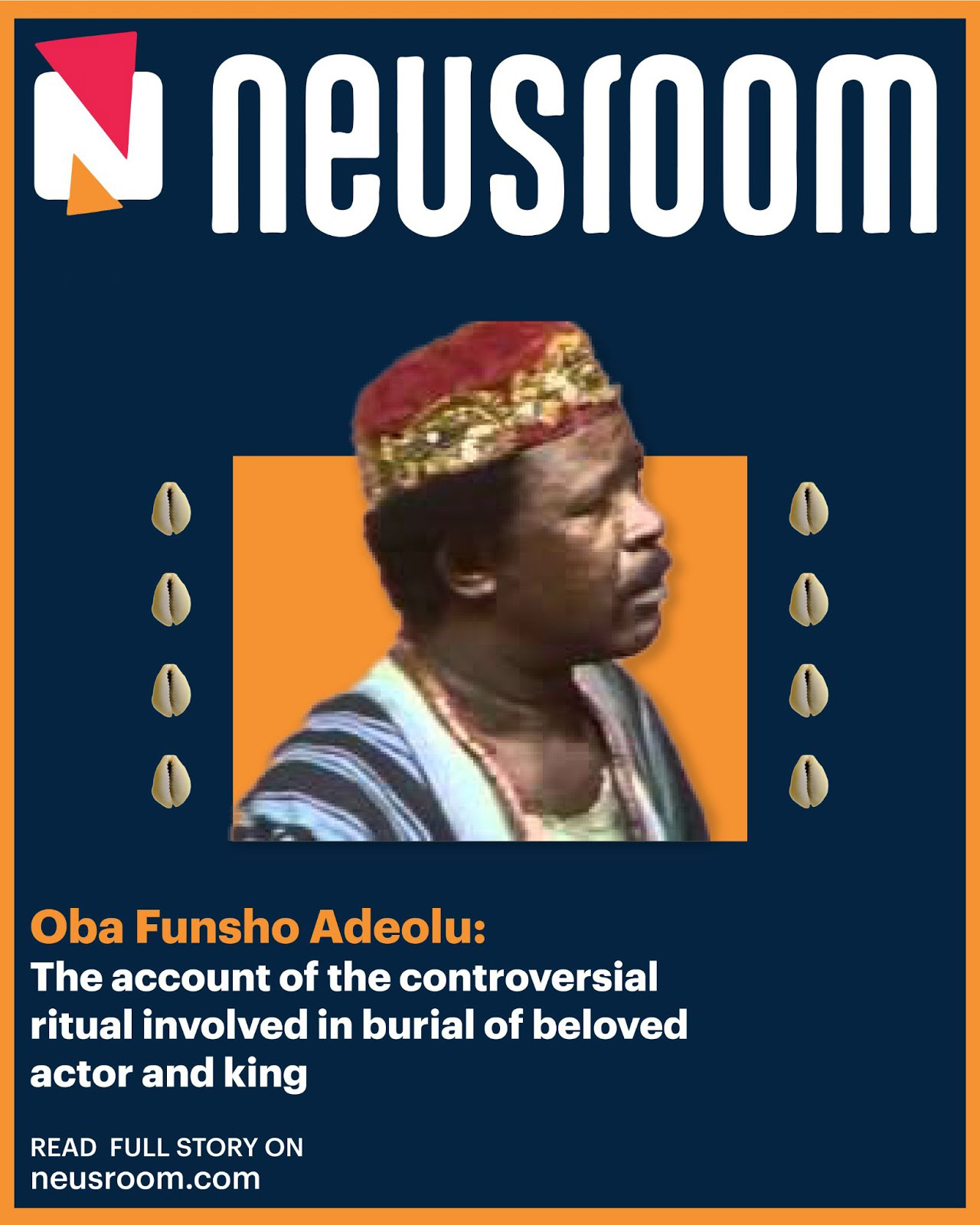
Oba Funsho Adeolu: The account of the controversial ritual involved in burial of beloved actor and king
Written by Omotayo Yusuf for Neusroom
21 June 2021
In late September 2008, residents of Ode-Remo in Ogun state hurried home from schools, offices, and markets. A 12am to 6am curfew had been declared as part of the Oro burial rite of their late king, Kabiyesi Sunday Funsho Adeolu. The events of that night are shrouded in secrecy and have been a source of lingering controversy.
The king had died after a brief illness on August 21, 2008 at Kings College Hospital in London at the age of 77. He was famous first as an actor who featured in a long-running TV drama, The Village Headmaster, before he yielded to the calling of his people to ascend the throne as Alaye of Ode Remo. The series of events that occurred after his death has triggered debates about historical and spiritual practices related to the burial of kings in Youbaland.
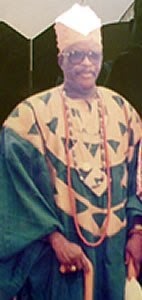
Early Life
Funsho Adeolu was born in 1931 and grew up in a vicarage. Although they were members of the Methodist church, he knew that he and his younger brother were potential heirs to the throne based on line of succession.
He attended Ahmadu Bello University before proceeding to the London School of Journalism. He became a teacher at King’s College Lagos before moving to Texaco Nigeria Limited as Area Manager. He also worked at Rank Xerox Nigeria Limited as Training Manager. He had a brief spell as a sport commentator at the Nigeria Broadcasting Corporation.
Adeolu as Actor
He was a lover of arts and theatre who took part in many productions including, “Things Fall Apart” and “Son Of Africa”. He was popularly known as Chief Eleyinmi in “The Village Headmaster” written by the late Ambassador Olusegun Olushola.
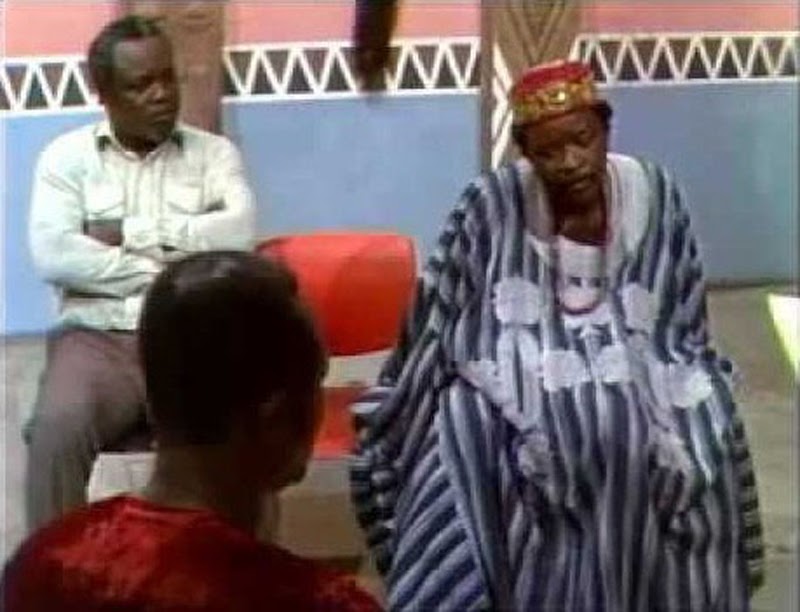
Oba Funsho Adeolu (right) loved art and passionately put his heart into his acting. Photo: The Nation.
It was from “The Village Headmaster” that his popularity would soar. He played the role of the stern Chief Eleyinmi who was the second-in-command to the king in the fictional Yoruba town of Oja. The series which first ran as a radio show aired from 1968 to 1988. After leaving the TV show, many people started to refer to him as Chief Eleyinmi.
Adeolu as a King
The coronation of a king in Yorubaland is divided into two: there are aspects that involve townsmen and women and these usually are the lighter events involving festivity. There is another aspect shrouded in secrecy that only people of religious significance are privy to and very few even disclose. This has given rise to speculations some of which have no basis in truth.
Generally however, it is believed that a Yoruba king is the representation of the gods in human form who is also part of a chain of kings. Thus, the coronation of a king represents his connection to his predecessor. In Yorubaland, when a king passes away, the expected expression to be used is Oba waja which loosely translates to the “king has transited” (to another realm) as a king is believed considered incapable of experiencing death.
Many of the rites involved in the coronation of Yoruba kings regardless of the town they head are supposed to be similar in a lot of instances. Ifa which is the documented code of conduct and system of divination provides a systematic way of how things should be done in the selection, coronation and burial of kings.
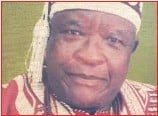
Oba Funsho Adeolu said nobody should eat him as he did not eat anyone – Erelu-Tunwase Photo: This Day.
Oba Funsho Adeolu was crowned in 1990. Those who knew him from his theatre days noted the sharp contrast between the stern-looking Chief Eleyinmi and the very cordial Kabiyesi. According to Erelu-Tunwase of Ode Remo who spoke to Neusroom, the king threw his door open to all and sundry and was quoted as always saying: “God would not allow me look down on others or become too full of myself.” She recalled that when she got her chieftain title, the king instead of demanding money from her, gave her cash in different currencies. Significantly however, she said the king told her in confidence that
“nobody should eat him as he did not eat anyone.”
The significance of this statement brings up the debate about some of the mysterious rites involved in the coronation of Yoruba kings. There are reports, although no pictorial or audio-visual evidence exists, that Yoruba kings eat the hearts of their predecessors which is the significance of the expression Ije Oba which translates to “becoming king” although some translate it literally as “eating (a) king.”
Death and ‘Burial’
Oba Adeolu was flown to London in 2008 when he was ill. He received treatment at Kings College Hospital where he ultimately passed away and his body was brought back to Nigeria. The then-governor of Ogun state, Otunba Gbenga Daniel, sent his condolences as well as other Yoruba kings. The events that happened in the coming days were a sharp contrast to what one would expect would happen to a widely-beloved king who served his people with dignity. Hon. Alderman Erelu Lola Ayonrinde who is the Erelu Tunwase of Ode-Remo provides a vivid claim of what happened after his body was received by the “Afobajes / Kingmakers, Abobakus (destined to die with the King) and Olokunesin known as Odis (slaves) of Ode Remo / Ijebu-land”
In a document she shared with Neusroom, she said that when “he joined his ancestors/died, instead of a befitting burial, the whereabouts of his remains are still unknown. What we know is that the body was brutalised, treated like that of a criminal, dragged around on the streets of the town, his head left hanging for many weeks until the neck was rotten to allow the neck to come off naturally without the use of a sharp knife. Once the head came off, the body was cut into pieces, his heart removed to be eaten by his successor. His head is still in captivity somewhere in Ode Remo, Ogun State. He has no grave”
Burial tradition?
The burial of Yoruba kings as mentioned earlier is shrouded in secrecy. However, what is of debate is whether human sacrifices and mutilation of the body of the kings are part of Ifa corpus. Erelu Tunwase does not think so. An expert on Ifa and the Yoruba monarchical system who is also a chieftain, she argued that anything outside of what Ifa prescribes is fake and only an innovation. According to her, “there is no shred of evidence in line with the YORUBA – “IFA” religious doctrine which recommends the way in which Oba Funso Adeolu’s remains were treated.” She further argued that this practice is not done in Ile Ife and Oyo which provide indication on how monarchy in other Yoruba towns should be managed. She said she considers the practice an aberration and fake and wondered how those who are supposed to be traditional council of parliament would also be working as undertakers.
Oluwo of Ode-Remo speaks
High Chief Femi Ogunfowora, the Oluwo of Ode Remo, who has both a traditional and spiritual role in the coronation and burial of kings in the town told Neusroom the people of Ode Remo were originally from Ife and thus cannot do anything that is contrary to the dictates of their origin and Ifa.
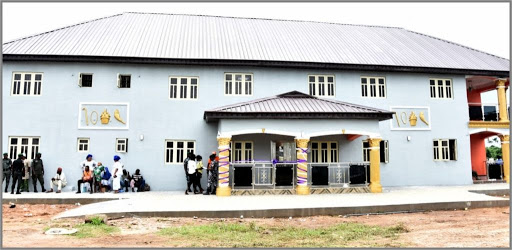
As Alaye of Ode Remo, Oba Funsho Adeo-Olu was known to open its doors to everyone. Photo: City People.
“Many of the things that are said about our practices are untrue. We love and respect our kings; why then would we treat them badly or disrespect them when they pass away?
“Every religious practice has its own rights. While some are open to the public, others are done in secrecy which symbolize their reverence. When the Alaye of Ode Remo dies, his body is handed over to the Odi who are the ones responsible for how the body is treated. I am one of the few people who is privy to the things that happen and I was there when Oba Funsho Adeolu’s body was received”
When Neusroom asked the Oluwo to reveal the things that happened to the body of the late king, he replied:
“Those are things that are preserved in secrecy but one thing I can tell you is that the body of the king was not desecrated. We did not and do not drag the body of our kings across the street as the Erelu claimed. She is a woman and women are neither members nor are they privy to the things that go on there. I don’t know where she got her own version of the event from because it is far from our practice.
“When the Odi receive the body of the kings, there are some rites they perform before burying them in a special place that is not known to the people. A year after the death of Oba Adeolu, his family had a remembrance event. It was a happy celebration. If his people were not satisfied with the burial process, they won’t have had that event”
When asked where the body of the king is buried, the Oluwo said it’s a matter of secrecy and such information is not released to the general public.
Similar occurrence
The Oba Adeolu situation is historically not an isolated incident. In 2005, the Alake of Egbaland, Oba Oyebade Mofolunso Lipede, passed away at the age of 90 after ruling for 33 years. He was also a much-loved and respected king who brought transformation to Abeokuta and its environment. He is even considered the best they have had.
When he passed away in 2005, his wife, Olori Bimpe, explained that her husband had demanded to be given a Christian burial. When all her explanation fell on deaf ears, she did the unthinkable by placing his body in the booth of her car and fled to Lagos. Other reports claimed she hid the body in one of the rooms in the palace while the traditionalists looked for it. The body was ultimately recovered and handed over to the ritualists for the appropriate rites.
Chief Alani Bankole who is the Oluwo of Iporo Ake and the Seriki Jagunmolu of Egbaland explained that the body of the late Alake ceases to belong to his family when he passes away and becomes the property of the people.
He said during the launch of his book on Egba monarchs: “Traditionally, as soon as an Oba joins his ancestors, his family ceases to have control. So, the Olori or family does not have the authority to go near his remains, let alone take them away. The impasse was resolved when the kingmakers found the Oba’s remains in one of the rooms in the palace, but that was not without a thorough search.
“If such a thing occurred, I would not blame the Olori or whoever was involved in such an abomination because, as it is popularly said, if you give a hoe to a mad person, he will till the soil to his side. I think that we, kingmakers, should take full responsibility for all the drama that happened.
“I make this statement on the grounds that we should have been more proactive in our responsibilities. Ideally, the moment we begin to sense that the health of an Alake is deteriorating, all the occupants of the palace are supposed to be sent packing and the palace taken over by the ‘Omo-Iya-Marun’.
“Perhaps, I should state here that the palace does not belong to the Alake because it is actually owned by the entire sons and daughters of Egbaland and kept under the care of the ‘Omo-Iya-Marun’.
Ogun Traditional Rulers (Installation And Burial Rites) Bill
In a bid to address the issues related to the coronation and burial of traditional rulers in Ogun state, a bill was introduced by Hon. Akeem Balogun representing Ogun Waterside State Constituency and was seconded by Akeem Amosun at the state assembly calling for a constitutional intervention to allow traditional rulers choose how they want to be buried.
In the proposed bill titled Ogun State Traditional Rulers (Installation and Burial Rites) Bill 2020, the lawmaker argued that modernity should be injected into the process and barbaric acts should be eradicated. Although the bill did not specify which specific aspects of the tradition it wants to modernise, the lawmakers agreed that rulers should choose if they want to be buried as Muslims, Christians or traditionalists.
The Oluwo of Ode Remo however argued against the bill despite the fact that it has passed the first reading and seems to be accepted by majority of the lawmakers. Speaking to Neusroom, he said a traditional ruler is subject to the dictates of the tradition and cannot choose the ones to opt out from.
He said: “When a king is installed, he ceases to be a Muslim or Christian. When he dies, he is buried in line with the tradition. What they are trying to do does not concern them.” This sentiment is also being shared by some Yoruba kings who believe the sanctity of the tradition should be preserved and not diluted by modernity.
The Alaafin of Oyo, Oba Lamidi Adeyemi, said the lawmakers have no duty getting involved in matters of coronation and burial of kings.
He said: “What is the motive behind it? Notwithstanding, whatever motive they are out to serve, the issue is an attempt to demystify Yoruba culture and tradition which specifies certain rites for traditional rulers as their status requires.
“Traditional ruler rites are surrounded by myth which has been preserved from time immemorial. What do they say is wrong with those rites?
“What I see is a topic to stir controversy which I won’t be a part of. But as the Alaafin, I am duty bound to say the implications of a thing like this.”
The Oluwo of Iwo, Oba Abdulrasheed Akanbi, however argued that there is need for review of some of the traditional practices especially the ones that make the people look barbaric.
He said: “If Obas like Baba Awujale, myself (Oluwo) and the Osile Oke Ona are clamouring for an upgrade in our tradition, culture and beliefs, you need to know that though our tradition is beautiful, there are some parts of it that need to be taken out because they are not in tune with the 21st century.
“Some of the changes and eradication we want in our tradition are those that make us look like cannibals and animals. There is no doubt that Yoruba culture is the best. No one gains anything from destroying our culture. We will only be at disadvantage should we fail to blend the tradition with modern realities. Change is constant.”
The bill has passed the first reading and has entered the second reading. It is not known whether it would ultimately become a law and overturn the reported controversial practices of the coronation and burial of kings. The debate goes on.

